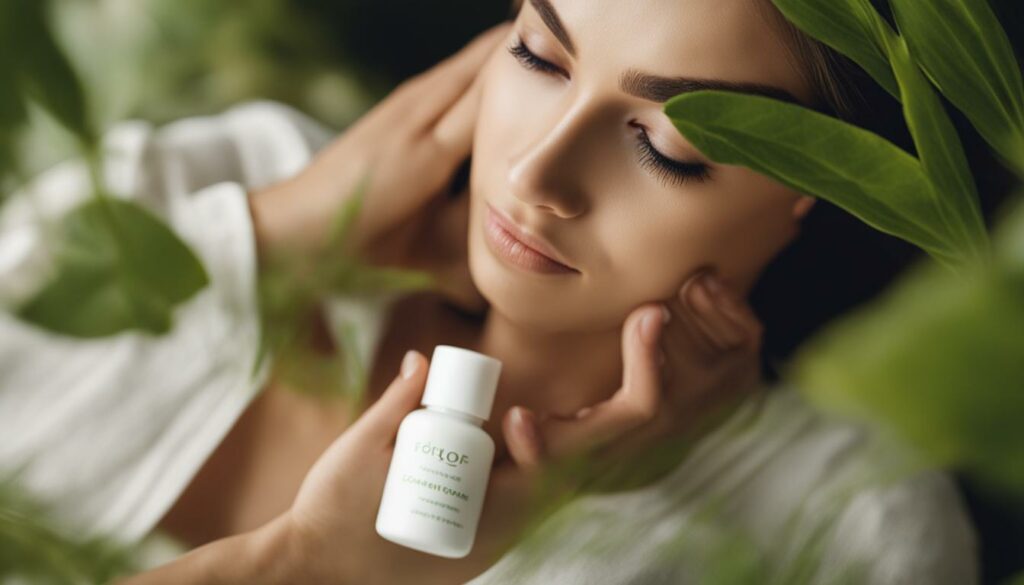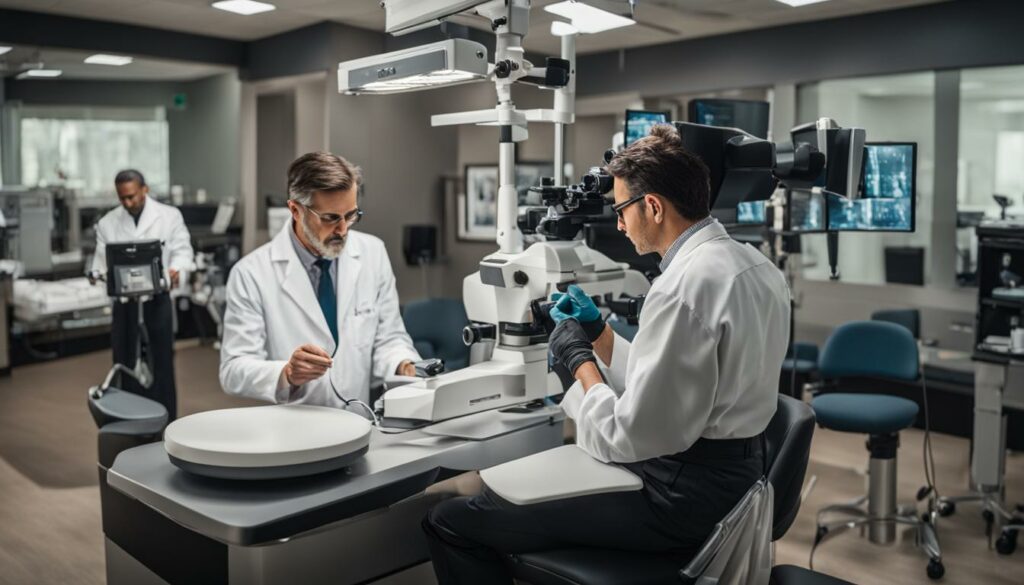Good vision is crucial for daily life activities, and regular eye care is essential to maintain your eye health. Neglecting eye care can lead to severe eye diseases and vision problems in the long run. It is important to take proactive measures to prevent eye-related problems and maintain healthy eyesight.
In this section, we will discuss the significance of eye care and provide detailed insights into effective solutions for maintaining healthy vision. We will cover a range of topics, including eye care routines, products, professional eye care specialists, and tips for preventing strain. By the end of this section, you will gain a better understanding of how to prioritize eye care and how to incorporate the best practices for optimal vision health.
Key Takeaways
- Regular eye care is vital for maintaining healthy vision.
- An effective eye care routine involves proper nutrition, eye exercises, and adequate rest.
- Using recommended eye care products and seeking professional help is crucial for reliable eye care.
- Preventing eye strain involves managing lighting conditions and wearing protective eyewear.
- Prioritizing eye care can significantly improve your overall vision health.
Developing a Comprehensive Eye Care Routine
To maintain optimal vision health, it is crucial to establish a comprehensive eye care routine. Here are some practical eye care tips:
- Eat a Balanced Diet: Consuming a diet rich in vitamins and minerals is essential for eye health. Foods high in omega-3 fatty acids, vitamin C, and zinc can help prevent age-related vision problems.
- Exercise Your Eyes: Perform regular eye exercises, such as focusing on distant objects, to strengthen eye muscles and improve visual acuity.
- Take Breaks: Reduce eye strain by taking regular breaks from computer and phone screens. Follow the 20-20-20 rule, where every 20 minutes, look away from the screen at an object at least 20 feet away for 20 seconds.
- Get Enough Rest: A good night’s sleep is essential for overall eye health. Lack of sleep can cause eye fatigue and dryness.
- Use Natural Remedies: Applying a warm compress or using herbal eye drops can help reduce inflammation and promote eye health naturally.
Developing a regular eye care routine can help prevent eye problems and promote long-term vision health. In addition to the above tips, consider seeing an eye care specialist for routine eye exams and customized advice based on your individual needs.
“Eye exercises are a simple, effective natural remedy to improve vision.”
Essential Eye Care Products for Everyday Use
Using recommended eye care products is an essential part of any eye care routine. A combination of natural and organic products can provide the best protection for your eyes. Here are some of the top eye care products to use on a daily basis:
Cleansers
Keeping your eyes clean is crucial to maintaining eye health. Use a gentle cleanser like Cetaphil Gentle Skin Cleanser or Neutrogena Hydro Boost Gentle Cleansing Lotion to remove any dirt or debris from your eyelids and the skin around your eyes. Be sure to avoid products that contain harsh chemicals or fragrances.
Moisturizers
Applying a moisturizer daily can help prevent dry eyes and reduce the appearance of fine lines and wrinkles. Look for a non-greasy, fragrance-free formula like CeraVe Eye Repair Cream or La Roche-Posay Hydraphase Intense Eye Cream.
Eye Drops
If you suffer from dry eye syndrome, eye drops can provide quick relief and soothe irritation. Look for preservative-free drops like Refresh Optive Lubricant Eye Drops or Blink Tears Lubricating Eye Drops to avoid any unwanted chemicals or additives.
Techniques for Applying Eye Care Products
When it comes to applying eye care products, it’s important to be gentle and avoid any unnecessary tugging or rubbing. Use your ring finger to gently pat in moisturizer or eye drops, starting from the inner corner of your eye and working outwards. For cleansers, apply a small amount to a cotton pad and dab gently along your eyelids and lash line.

“Natural and organic products can provide the best protection for your eyes.”
Seeking Professional Eye Care Specialists
Regular eye exams are essential to maintain optimal vision and prevent potential eye problems from worsening. Consulting eye care specialists is a crucial aspect of eye care, as they are equipped with the knowledge and expertise to diagnose and treat various eye conditions.
There are different types of eye care specialists, such as optometrists and ophthalmologists, each specializing in different areas of eye care:
| Type of Specialist | Description |
|---|---|
| Optometrists | These professionals provide primary care services, such as vision exams, eyeglass and contact lens prescriptions, and diagnosis and treatment of common eye conditions. |
| Ophthalmologists | These professionals specialize in eye and vision care, including surgery, diagnosis and treatment of serious eye conditions, and management of eye diseases such as glaucoma and cataracts. |
When should you visit an eye doctor? Experts recommend that adults with no symptoms of vision problems should have an eye exam every 1-2 years, while those with current eye conditions or symptoms may require more frequent exams. Children should have their first eye exam at six months and then again at three years old. After that, they should follow the advice of their optometrist or ophthalmologist.

Tip: Don’t wait until you experience symptoms to visit an eye doctor. Many eye conditions don’t cause noticeable symptoms until they have progressed, so it’s crucial to schedule regular eye exams to catch potential problems early on.
During an eye examination, the specialist will perform various tests to assess your vision, eye muscle function, and overall eye health. They may also dilate your pupils to examine the interior of your eye. If the specialist detects any issues, they will recommend treatment options such as medication, corrective lenses, or surgery, depending on the severity of the condition.
To maintain optimal vision, it’s crucial to prioritize eye care and seek professional help when needed. With the guidance of a qualified eye care specialist, you can receive the best possible care and maintain clear, healthy vision.
Preventing Eye Strain and Protecting Your Eyes
Eye strain is a common concern for many people, particularly those who spend long periods looking at screens or reading. Fortunately, there are several strategies you can implement to prevent eye strain and safeguard your vision.
Proper Lighting Conditions
One of the easiest ways to reduce eye strain is to ensure you have proper lighting conditions when reading or using a screen. Make sure the room is well lit, and avoid using electronic devices in the dark. If you are using a computer, adjust the brightness and contrast settings to suit your preferences.
Take Breaks
Another crucial aspect of preventing eye strain is taking regular breaks. Follow the 20-20-20 rule – every 20 minutes, look away from your screen for 20 seconds at an object 20 feet away. This can help prevent eye fatigue caused by prolonged screen time. Additionally, you should take frequent breaks and go for a walk or perform simple eye exercises to relieve tension in your eyes.
Use Protective Eyewear
Shielding your eyes from harmful UV rays is essential for preventing vision damage. When outside in bright sunlight, wear sunglasses that block at least 99% of UV-A and UV-B radiation. If you participate in activities that require protective eyewear, such as sports or construction work, make sure you have suitable glasses or goggles.
Adjust Your Workstation
If you spend long hours working on the computer, it’s crucial to adjust your workstation to minimize the risk of eye strain. Ensure that your screen is positioned at the appropriate distance from your eyes and adjust it so that the top of the screen is at or below eye level. Additionally, use an ergonomic chair to maintain proper posture and avoid neck and back strain.
Get Enough Sleep
Finally, getting adequate rest is crucial for protecting your eyes and preventing eye strain. Aim for at least seven hours of sleep each night and avoid staying up late watching TV or using electronic devices. Ensuring you get enough sleep will not only help prevent eye strain but also improve your overall health and well-being.
Discover How Much Protein You Should Eat to Lose Weight and Build Muscle
Conclusion
In conclusion, taking care of your eyes is crucial for maintaining optimal vision health. By implementing a comprehensive eye care routine and following the recommended solutions discussed in this article, you can prevent common vision problems and safeguard your eyes from daily stressors. Remember to prioritize your eye health and make it a part of your daily routine.
Regular eye exams are also important in detecting any potential issues early on. Seek professional help from an eye care specialist if you experience any vision changes or concerns.
Preventing eye strain and protecting your eyes from harmful UV rays are also essential for maintaining healthy eyes. Make sure to wear protective eyewear when necessary and adjust your workspace or environment to minimize eye strain.
By prioritizing eye care and adopting effective solutions, you can enjoy clear vision for years to come. Take care of your eyes and give them the attention they deserve!
FAQ
What are some effective eye care solutions for maintaining healthy vision?
There are several strategies you can incorporate into your daily routine to promote eye health. These include eating a nutrient-rich diet, managing stress levels, protecting your eyes from harmful UV rays, and practicing good hygiene habits such as avoiding rubbing your eyes with dirty hands.
How can I develop a comprehensive eye care routine?
Developing a comprehensive eye care routine involves various aspects. Some key tips include getting regular eye exams, practicing good eye hygiene, maintaining a healthy lifestyle, protecting your eyes from prolonged digital screen exposure, and performing eye exercises to strengthen your eye muscles.
What are some essential eye care products I should consider using?
There are several eye care products that can help promote healthy eyes. These include gentle cleansers for removing makeup and impurities, moisturizing eye creams to hydrate the delicate skin around the eyes, and lubricating eye drops to alleviate dryness and discomfort. Opting for natural and organic products can also be beneficial.
When should I seek professional help from an eye care specialist?
It is important to visit an eye care specialist regularly, especially if you experience any changes in your vision or eye health. Schedule an appointment with an eye doctor if you notice symptoms such as blurry vision, eye pain, redness, or sudden vision loss. It is also advisable to have routine eye exams to catch any potential issues early on.
How can I prevent eye strain and protect my eyes?
To prevent eye strain, take frequent breaks when using digital devices, adjust your screen brightness and font size to comfortable levels, and ensure proper lighting in your environment. Additionally, wear protective eyewear when engaging in activities that may expose your eyes to potential hazards, such as sports or DIY projects.











